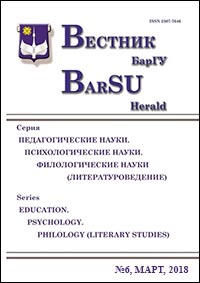CONSCIENCE AS A STRUCTURAL COMPONENT OF CONTEMPORARY YOUTHSELF-IDENTIFICATION
Keywords:
conscience; self-identification; self-image; thinking; adolescenceAbstract
The article is devoted to the consideration of conscience as a structural component of person’s self-identification, a deliberate image of the “future self”. Four groups of interconnections of self-image are revealed, the structural and formal characteristics of conscience perception by contemporary youth are presented: (1) lack of perception of conscience and the “future self” (“diffusive self”); (2) the “future self” as a “social self”, the perception of conscience in
the form of pre-conceptual thinking; (3) the “future self” as an “immanent self”, the perception of conscience in the form
of pre-conceptual or conceptual thinking; (4) the “future self” as a “transcendent self”, the perception of conscience in the form of conceptual thinking. The statistical analysis of the data shows that adolescence is a sensitive period to create the image of the “future self” in connection with the development of the perception of conscience.
Fig. 2. Ref.: 2 titles.
Downloads
Published
Issue
Section
License
Copyright (c) 2023 Вестник БарГУ Серия "Педагогические науки. Психологические науки. Филологические науки"
Это произведение доступно по лицензии Creative Commons «Attribution-NonCommercial» («Атрибуция — Некоммерческое использование») 4.0 Всемирная.
Авторы сохраняют за собой право заключать определенные договорные соглашения, касающиеся неисключительного распространения опубликованной версии работы (например, размещать ее в институциональном репозитории, публикация в книге) со ссылкой на ее первоначальную публикацию в этом журнале.





